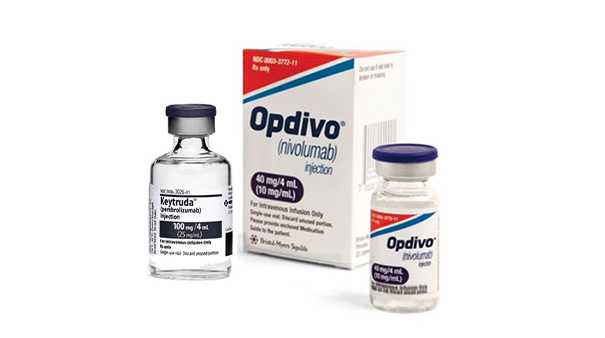Opdivo and Keytruda approved in new lung cancer uses

The FDA has approved Merck's Keytruda (pembrolizumab) as a combination treatment for metastatic nonsquamous non-small cell lung cancer (NSCLC), after green-lighting Bristol-Myers Squibb’s (BMS) rival blockbuster Opdivo (nivolumab) for small cell lung cancer (SCLC).
Merck, known as MSD outside the United States and Canada, announced that the FDA has approved an expanded label for Keytruda, Merck’s anti-PD-1 therapy, in combination with Eli Lilly's Alimta (pemetrexed) and platinum chemotherapy for the first-line treatment of patients with metastatic nonsquamous NSCLC, with no EGFR or ALK genomic tumour aberrations.
US approval has been granted based on results of the pivotal phase 3 KEYNOTE-189 trial, which demonstrated a significant improvement in overall survival reducing the risk of death by half compared to chemotherapy alone.
The study also showed a significant improvement in progression-free survival (PFS) compared to chemotherapy alone.
Dr. Roger M. Perlmutter, president of Merck Research Laboratories, said: “Keytruda is rapidly becoming a foundation for the treatment of appropriate patients with metastatic non-small cell lung cancer.”
“Today’s approval of the expanded label for Keytruda based on data from the KEYNOTE-189 trial is an important milestone, and reinforces our steadfast commitment to improving survival outcomes, and providing hope, for more patients with lung cancer.”
Keytruda as a combination treatment was first approved in 2017 under the FDA’s accelerated process for the treatment of metastatic nonsquamous NSCLC, based on tumour response rates and progression-free survival data from the phase 2 study KEYNOTE-021.
In line with the accelerated approval process, Merck continued gathering and verifying clinical benefit, which has now been demonstrated in KEYNOTE-189, resulting in the FDA converting the accelerated approval to full approval.
Keytruda is the first anti-PD-1 approved in the first-line setting as both combination and monotherapy in certain patients with metastatic NSCLC.
BMS's Opdivo
But BMS has managed to get Opdivo approved in the SCLC indication ahead of Keytruda, after the FDA approved it in patients whose cancer has progressed after standard regimen chemotherapy and at least one other line of approved treatment.
The approval was based entirely on data from the SCLC group of the ongoing study CheckMate -032 evaluating the drug efficacy in patients who experienced disease progression after standard chemotherapy.
In the group of 109 patients receiving the drug for 17.9 months, 12% positively responded to treatment, 11% of patients had a partial response and one patient had a complete response.
Sabine Maier, development lead, thoracic cancers at BMS, said: “We recognise the critical need to provide patients with cancer therapies that may offer more durable responses, particularly for those living with hard-to-treat, aggressive diseases like small cell lung cancer.”
“This approval builds on our heritage of bringing immuno-oncology therapies to patients with other types of thoracic cancers. It also reinforces our commitment to bringing transformative treatments to patients in urgent need of effective new options.”
Prior to Opdivo, the only treatments available for SCLC patients in the US were chemotherapy, radiotherapy and surgery.
The novel approach of the BMS drug is targeting and blocking the activity of PD-1, a protein that prevents T cells from recognising and attacking inflamed tissues and cancer cells.











